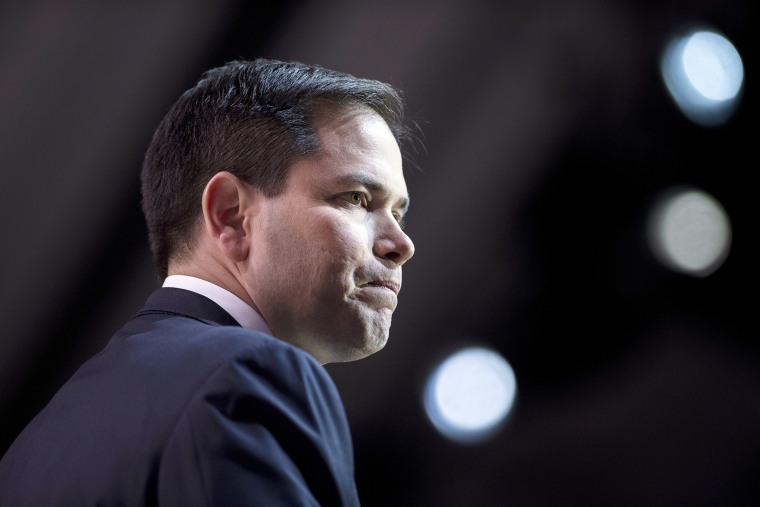When Marco Rubio was majority whip of the Florida House of Representatives, he used his official position to urge state regulators to grant a real estate license to his brother-in-law, a convicted cocaine trafficker who had been released from prison 20 months earlier, according to records obtained by The Washington Post. In July 2002, Rubio sent a letter on his official statehouse stationery to the Florida Division of Real Estate, recommending Orlando Cicilia "for licensure without reservation." The letter, obtained by The Washington Post under the Florida Public Records Act, offers a glimpse of Rubio using his growing political power to assist his troubled brother-in-law and provides new insight into how the young lawmaker intertwined his personal and political lives.
Another controversy poses new threat to Rubio campaign
If you're an on-the-fence Republican, unsure if Rubio truly has what it takes, new revelations probably won't put fears to rest.

In October, Jeb Bush's campaign officials prepared a slide show for donors, sharing their perspective on the race for the Republican nomination. One of the slides included an interesting headline: "Marco Is A Risky Bet."
It's a familiar refrain in Republican circles: Marco Rubio may be a media darling, and he may be lining up a small army of billionaire backers, but troubles lurk just below the surface. Even if the party is prepared to overlook his lack of accomplishments and lack of policy depth, the lurking "risks," the argument goes, should give the GOP pause.
Most of the time, whispers about the Florida senator's troubles are kept vague, but the list of documented Rubio controversies is quite real. His misuse of state party credit cards for personal use, for example, is part of a story about the Republican's controversial personal finances. There's also the matter of his close ties to a former scandal-plagued congressman, David Rivera.
Just before the holiday weekend, the Washington Post reported on the latest revelation from Rubio's recent past.
In his official capacity, Rubio vouched for Cicilia, telling state regulators he'd known the former cocaine dealer "for over 25 years," but he neglected to mention the family connection -- and the fact that Cicilia was living with Rubio's parents at the time.
The Post's article added that Rubio "declined to say whether he or his family received financial assistance from Cicilia, who was convicted in a high-profile 1989 trial of distributing $15 million worth of cocaine. The federal government seized Cicilia's home; the money has never been found."
The Rubio campaign, thus far, hasn't exactly come up with a compelling response to this, arguing that it is "appalling and shameful" that the newspaper is dragging Rubio's brother-in-law "into the spotlight."
In other words, we're apparently supposed to see Rubio using his office to quietly help his family as off-limits.
It's often difficult to know what the political world -- voters, pundits, candidates, etc. -- will find important, and if the Sunday shows are any indication, news organizations have already decided they don't much care about this story. I'd note for context, however, that in 1992, there was quite a bit of attention surrounding Bill Clinton's brother, Roger, who was also arrested and imprisoned for dealing cocaine.
Republicans accused the then-governor of pressuring the state police to look the other way, but all of the evidence pointed in the exact opposite direction: when law enforcement officials presented Clinton with evidence against his brother, the governor told them to proceed as they would with any other suspect.
There's no evidence of Clinton ever using any of his offices to pull strings for his brother, though there is evidence of Rubio using his office to benefit his brother-in-law who had similar troubles. (When Cicilia was arrested, it was "one of the largest drug cases in Florida history.")
If you're an on-the-fence Republican, unsure if Rubio truly has what it takes, will a story like this assuage your concerns about the young senator? It probably won't help.